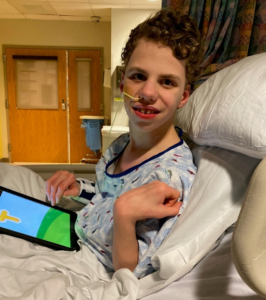Voices of LGS and Natural History

Learn about Lennox-Gastaut Syndrome from those who know it best, the LGS Patient-Family Community.
The LGS Foundation is harnessing the power of the patient-family community to ensure that research, care, support services, education, and awareness of LGS are relevant for those living with LGS and their loved ones.
A cross-sectional survey was conducted to collect self-reported information from caregivers of children with LGS and other DEE regarding their perspectives and experiences with healthcare providers’ evaluation of behavior, communication, and QoL. The survey tool was developed by the study investigators in partnership with the LGS Foundation and was diffused to caregivers online by epilepsy advocacy groups, including the Pediatric Epilepsy Surgery Alliance (PESA). Responses were analyzed. Descriptive statistics were calculated. The survey asked for caregiver perspectives and assessed which instruments the caregivers had previously been given for measuring these domains.
A cross-sectional survey of 120 parents of children with Dravet Syndrome, Lennox-Gastaut syndrome, KCNQ2-DEE, KCNB1-DEE, and SCN2A-DEE (ages 1-35 years) completed the Adaptive Behavior Assessment System-3 for ages 0-5 years, modified checklist for autism (mCHAT), communication and social behavior scales (CSBS), communication matrix (CM), and several parent-reported classifiers of communication. Adaptive Behavior Assessment System communication and social raw scores were the primary and adjunctive outcomes. Floor and ceiling effects, dispersion, and convergence with related measures were assessed.
The LGS Family Experience encompasses a range of emotions, including trauma, chaos, isolation, denial, heartbreak, and exhaustion. However, it also fosters opportunities for teamwork, compassion, and personal growth.
This 2022 LGS Family Experience Survey highlights key issues that significantly affect families within the LGS community.
We assessed score profiles on the ABC in a sample of 122 young people with DEEs, including Dravet and Lennox-Gastaut syndromes, KCNQ2- SCN2A-, and KCNB1-associated disorders. Then we examined its internal structure using item cluster analysis. We also conducted validity analysis on the various scoring methods with age, sex, and autism spectrum screening measure scores.
The Sibling Voices Survey assessed parental and sibling responses to questions designed to assess how children adapt to growing up with siblings with DEE. A cross-sectional survey of 248 parents and siblings of individuals with DEEs responded to online, age- and role-specific surveys to address the psychological and social impacts of being the sibling of a loved one with DEEs.
An online survey administered through parent-organized foundations utilized accepted functional classifications and questionnaires derived from common instruments to determine levels of mobility, fine motor, communication, and feeding functions. Statistical analyses focused on overall levels of function and across-group comparisons adjusted for age.
A cross-sectional study was conducted using caregiver-entered data (n=742) from the Rare Epilepsy Network on pediatric sleep disturbances, and Patient Reported Outcomes Measurement Information System measures for caregiver fatigue, sleep disturbance, sleep-related impairment, depression, anxiety, companionship, and cognition. Logistic regression was used to examine associations between risk factors and caregiver sleep quality.
In 2019, the LGS Foundation partnered with Dr. Anne Berg and asked caregivers to share their daily struggles and what it is like living with Lennox-Gastaut Syndrome. The goal is for this to help parents of newly diagnosed children understand what to expect, improve treatment and care from epileptologists and other providers, and support the development of personalized clinical trials in the future.
A one‐day workshop and a series of teleconferences were held with parents of children with severe, refractory epilepsy of early‐life origin and providers for children with epilepsy. The workshop sessions were structured as focus groups and aimed to identify components of seizure burden and their impact from the perspective of parents and providers. Data were gathered, organized, and refined during the workshop using an iterative 4‐step process that drew upon grounded theory.
On November 1, 2019, the LGS Foundation convened the first-ever Externally-Led Patient-Focused Drug Development (PFDD) meeting for the Developmental and Epileptic Encephalopathies (DEEs), including LGS.
In the DEEs and LGS PFDD meeting, researchers and drug development stakeholders met with families and caregivers of those affected by LGS. Their goal was to learn which avenues of research would be most impactful to the daily lives of the LGS community.
In 2018, the LGS Foundation conducted an in-depth survey of its 4,500-member patient and family community to better understand the frequency of symptoms seen in LGS, aspects of seizure treatment, and patient priorities. This survey was done in preparation for our 2019 PFDD Meeting.
The Connecticut Study of Epilepsy, a prospective, longitudinal study of 613 children with newly diagnosed epilepsy recruited in 1993‐1997. Central review of medical records permitted classification of epilepsy syndromes at diagnosis and at reclassification 2, 5, and 9 years later. LGS was compared to other epilepsies for seizure and cognitive outcomes and mortality.
Persons (n=795) with rare epilepsies and caregivers of those affected were recruited through the Epilepsy Foundation and more than 30 rare epilepsy advocacy organizations affiliated with the Rare Epilepsy Network (REN). A web-based survey was conducted using a questionnaire consisting of core sections to collect data from affected persons on various aspects, including comorbidities. Comorbidity information was grouped into 15 classes, 12 of which had a stem question followed by detailed branch questions and three created from a combination of related questions.
Read Personal Stories from the LGS Community
Updated 02/11/25 (KK)
